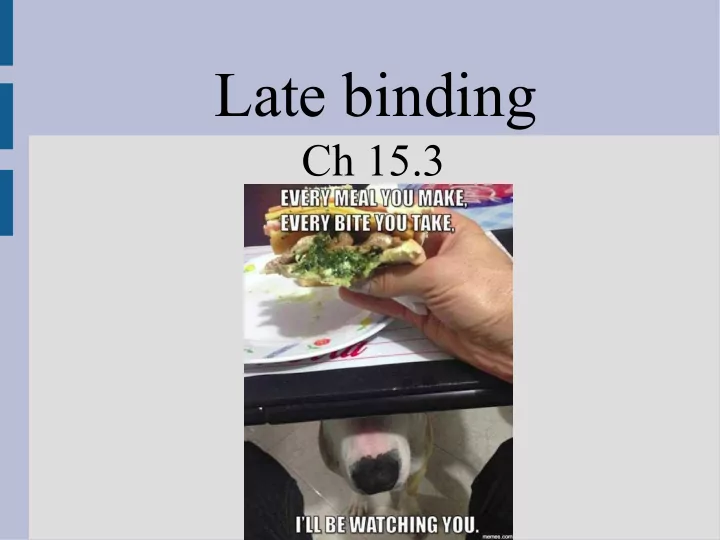

Late binding Ch 15.3
Highlights - Late binding for functions
Review: Storing types Last time we discussed how to properly store a Child object inside a Parent (using pointer) If we did not use a pointer, it would not work: This will only copy the Parent's part of a Child into itself (then delete child)
Early vs late binding Static binding (or early) is when the computer determines what to do when you hit the compile button Dynamic binding (late) is when the computer figures out the most appropriate action when it is actually running the program Much of what we have done in the later parts of class is similar to late binding
Dynamic binding Consider this relationship:
Dynamic binding Tell each of them to swing()!
Dynamic function binding Who's swing function is being run?
Dynamic function binding Who's swing function is being run? Answer: the Person's If you have normal variables, p=b only copies b's Person parts into p's Person box, so you still only have one swing function
Dynamic function binding Who's swing function is being run now?
Dynamic function binding Who's swing function is being run now? Answer: the Person's still... p is pointing to a full Boxer object, but it only thinks there is the Person part due to type (see: incorrectChildFunction.cpp)
Dynamic function binding If we want the computer to not simply look at the “type” of pointer and instead determine what action to take based on the object... ... we need to add virtual (this is slower) (see: dynamicBindingFunctions.cpp)
Dynamic function binding If you use a function to run an object and you want to use virtualization, you need to pass-by-reference (i.e. use an &) If you do not, it will make a copy an this Can be Person, will ignore the Child's part Boxer or Baseballer Always a Person
Dynamic function binding If you want to use this virtualization: 1. Pass in a pointer 2. Pass by reference (i.e. use &) Needs to be memory address so the computer can look at what type is actually there If you give it a Parent box, it cannot do anything but run normal Parent stuff (see: dynamicBindingFunctionV2.cpp)
virtual deconstructors If you use Parent* to dynamically create a instance of a Child class, by default it will ONLY run the parent's deconstructor With a virtual deconstructor it will run the deconstructor for whatever it is pointing at (the Child's deconstructor in this case) Thus it avoids memory leak (see: yetAnotherMemoryLeak.cpp)
Recommend
More recommend